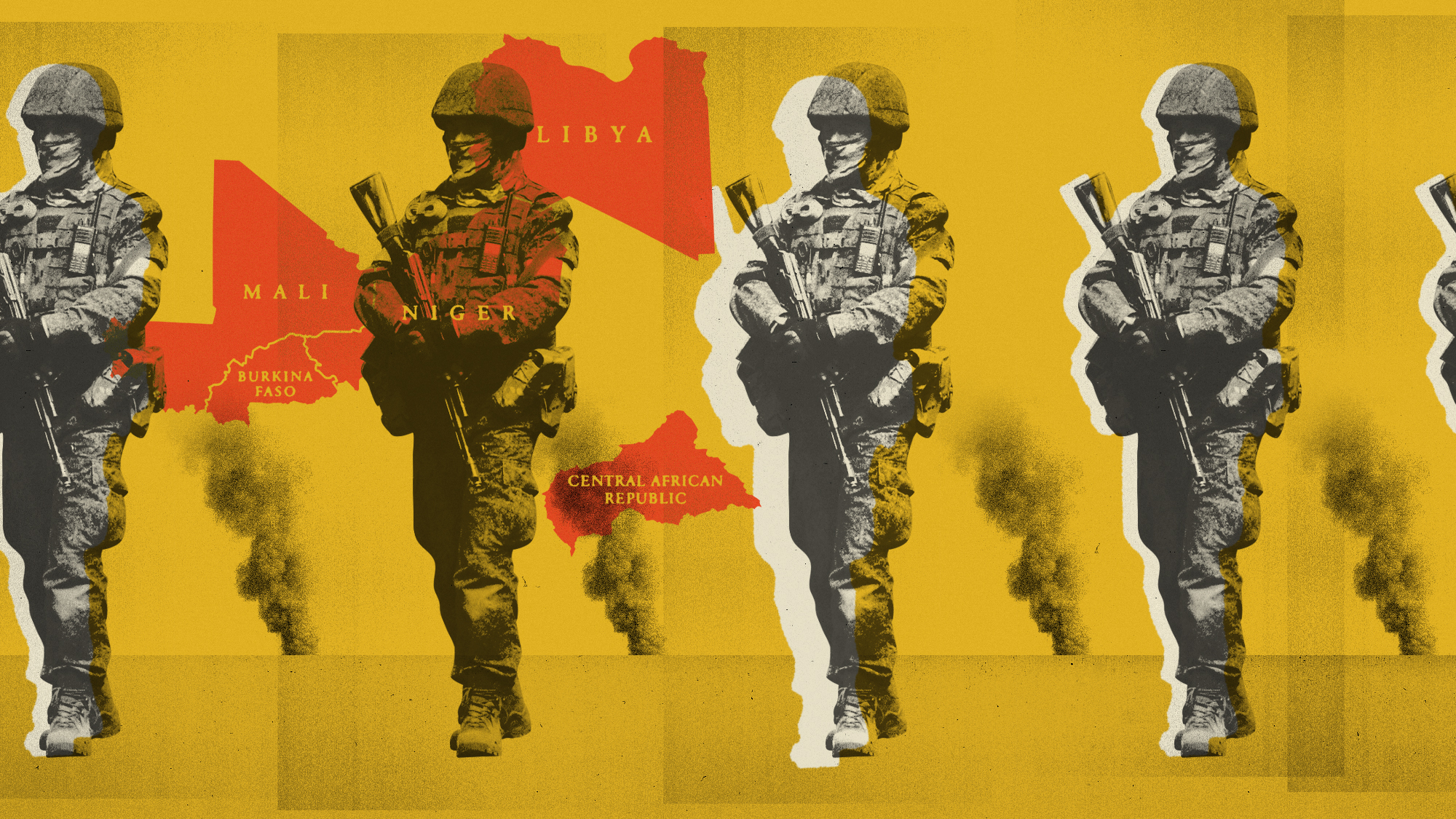Where has the Wagner Group gone?
Kremlin takes control of Russian mercenaries after aborted mutiny and death of leadership

A free daily email with the biggest news stories of the day – and the best features from TheWeek.com
You are now subscribed
Your newsletter sign-up was successful
When Russian mercenary leader Yevgeny Prigozhin died in a plane crash shortly after his aborted mutiny against the Kremlin, many assumed it was the end for his fabled Wagner Group.
Back then, Prigozhin was "probably the most feared and famous mercenary in the world", said the BBC. His Wagner Group oversaw "billions of dollars' worth of companies and projects", propping up regimes across Africa and the Middle East, and his fighters were also central to Russia's invasion of Ukraine. But much has changed since the mutiny of June 2023 – the biggest challenge to Vladimir Putin during his more than 20 years of leadership.
The group has now been effectively rebranded in Africa, reportedly as part of a wider effort to bring what remains of Wagner under the direct control of the Russian state.
The Week
Escape your echo chamber. Get the facts behind the news, plus analysis from multiple perspectives.

Sign up for The Week's Free Newsletters
From our morning news briefing to a weekly Good News Newsletter, get the best of The Week delivered directly to your inbox.
From our morning news briefing to a weekly Good News Newsletter, get the best of The Week delivered directly to your inbox.
What did the commentators say?
Plans by the Kremlin to "seize full control of the global empire built by the notorious military entrepreneur" began just hours after Prigozhin's "army of ex-convicts and mercenaries halted their advance on Moscow", said The Wall Street Journal.
Prigozhin, Wagner co-founder Dmitry Utkin and most of the rest of the group's leadership died in August last year, when an onboard explosion brought down their private jet flight from Moscow to St Petersburg. The Russian ministries of foreign affairs and defence quickly reassured Middle Eastern and African states that it would be "business as usual – meaning unofficial Russian boots on the ground would keep operating in these regions", said Alessandro Arduino, a lecturer from King's College London, on The Conversation. But now a "transformation is under way".
The group's activities in the Central African Republic (CAR), Libya, Mali, Sudan and Burkina Faso have come under the "direct supervision" of the Russian ministry of defence, said Arduino. Its rebranding as the Africa Corps – or the Russian "Expeditionary Corps" – "could be an attempt to add a layer of obfuscation to cover what has been in plain sight for a long time", he added, "that Russian mercenaries in Africa serve one master – the Kremlin".
Control of the Africa Corps has supposedly passed to General Andrey Averyanov, head of a secretive unit specialising in targeted killings, including the attempted novichok poisoning of Sergei Skripal in Salisbury in 2018.
A free daily email with the biggest news stories of the day – and the best features from TheWeek.com
Internal Russian government documents, seen by the BBC, detail how Russia is offering governments in Africa a "regime survival package" in exchange for access to strategically important natural resources. This is all "part of the process of the Russian government taking over the businesses of the Wagner mercenary group", said the broadcaster.
It appears to be a similar story in Ukraine. Despite reports in the Kyiv Post this week of fresh Wagner-branded soldiers arriving in Dzhankoy in the Crimea, Putin is "tightening his grip over what's left of the Wagner group", said Business Insider.
Former Wagner troops have been absorbed into Russia's national guard, also known as Rosgvardia, according to an update by the UK Ministry of Defence this month. And plans to establish a Wagner headquarters near a Russian barracks are "like a sign of its subordination", said Business Insider.
Sergey Sukhankin, a senior fellow at the Jamestown Foundation, said the Wagner Group had become "marginalised" and "de facto subordinated" to Russia's Defence Ministry in the six months following Prigozhin's death.
"The fighters will do what they are told" by the ministry, he said.
What next?
Analysts at the Centre for Eastern Studies in Warsaw believe that the arrival of Africa Corps personnel in Burkina Faso signals "both an expansion and the formalisation of the Kremlin's military presence in the Sahel region". It is "a cause that will be furthered by the installation of a military base in the CAR", said CNBC, part of Russia's attempts to establish "key strongholds in the continent".
In the long term, the Russian Defence Ministry will "no doubt seek to create a unified and loyal force dedicated to military action", said Arduino on The Conversation. "But one might surmise that greater allegiance to Moscow will likely come at the cost of reduced flexibility".
The speed with which many Wagner fighters have signed up to serve in the rebranded Africa Corps show they have "little loyalty to the company itself after Prigozhin's demise and would be willing to fight for whichever Kremlin-backed organization that exists in Africa," Raphael Parens, a fellow on the Foreign Policy Research Institute's Eurasia Program, told Business Insider.
Ultimately, "mercenaries care about the bottom line rather than an ideological alignment with Prigozhin", he said.
Elliott Goat is a freelance writer at The Week Digital. A winner of The Independent's Wyn Harness Award, he has been a journalist for over a decade with a focus on human rights, disinformation and elections. He is co-founder and director of Brussels-based investigative NGO Unhack Democracy, which works to support electoral integrity across Europe. A Winston Churchill Memorial Trust Fellow focusing on unions and the Future of Work, Elliott is a founding member of the RSA's Good Work Guild and a contributor to the International State Crime Initiative, an interdisciplinary forum for research, reportage and training on state violence and corruption.